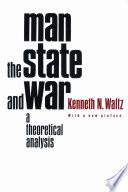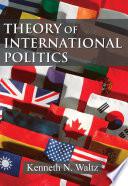“Once socialism replaces capitalism, reason will determine the policies of states.”
Source: Man, the State, and War (1959), Chapter V, Some Implications Of The Second Image, p. 150
Kenneth Neal Waltz was an American political scientist who was a member of the faculty at both the University of California, Berkeley and Columbia University and one of the most prominent scholars in the field of international relations. He was a veteran of both World War II and the Korean War.Waltz was one of the original founders of neorealism, or structural realism, in international relations theory and later became associated with the school of defensive neorealism. Waltz's theories have been extensively debated within the field of international relations. In 1981, Waltz published a monograph arguing that in some cases the proliferation of nuclear weapons could increase the probability of international peace.Leslie H. Gelb has considered Waltz one of the "giants" who helped define the field of international relations as an academic discipline. Columbia University colleague Robert Jervis has said of Waltz, "Almost everything he has written challenges the consensus that prevailed at the time" and "Even when you disagree, he moves your thinking ahead." Wikipedia

“Once socialism replaces capitalism, reason will determine the policies of states.”
Source: Man, the State, and War (1959), Chapter V, Some Implications Of The Second Image, p. 150
Source: Man, the State, and War (1959), Chapter VII, Some Implications Of The Third Image, p. 188
Source: Man, the State, and War (1959), Chapter IV, The Second Image, p. 81
Source: Man, the State, and War (1959), Chapter VIII, Conclusion, p. 230
Source: Theory of International Politics (1979), p. 110
Source: Man, the State, and War (1959), Chapter III, Some Implications Of The First Image, p. 42
Source: Man, the State, and War (1959), Chapter VI, The Third Image, p. 159
Source: Man, the State, and War (1959), Chapter II, The First Image, p. 16
“War may achieve a redistribution of resources, but labor, not war, creates wealth.”
Source: Man, the State, and War (1959), Chapter VIII, Conclusion, p. 224
Source: Man, the State, and War (1959), Chapter I, Introduction, p. 1
Source: Man, the State, and War (1959), Chapter IV, The Second Image, p. 98
“Each man does seek his own interest, but, unfortunately, not according to the dictates of reason.”
Source: Man, the State, and War (1959), Chapter II, The First Image, p. 23
“No system of balance functions automatically.”
Source: Man, the State, and War (1959), Chapter VII, Some Implications Of The Third Image, p. 210
Source: Man, the State, and War (1959), Chapter VI, The Third Image, p. 186
Source: Man, the State, and War (1959), Chapter III, Some Implications Of The First Image, p. 69
“In anarchy there is no automatic harmony.”
Source: Man, the State, and War (1959), Chapter VI, The Third Image, p. 160
Source: Man, the State, and War (1959), Chapter V, Some Implications Of The Second Image, p. 127
Source: Man, the State, and War (1959), Chapter VII, Some Implications Of The Third Image, p. 204
“To build a theory of international relations on accidents of geography and history is dangerous.”
Source: Man, the State, and War (1959), Chapter IV, The Second Image, p. 107
Source: Man, the State, and War (1959), Chapter VI, The Third Image, p. 163
“In a zero-sum game, the problem is entirely one of distribution, not at all one of production.”
Source: Man, the State, and War (1959), Chapter VII, Some Implications Of The Third Image, p. 202
Source: Man, the State, and War (1959), Chapter VIII, Conclusion, p. 238
Source: Theory of International Politics (1979), p. 4
“External pressure seems to produce internal unity.”
Source: Man, the State, and War (1959), Chapter V, Some Implications Of The Second Image, p. 149
Source: Man, the State, and War (1959), Chapter II, The First Image, p. 38
Source: Theory of International Politics (1979), p. 137

